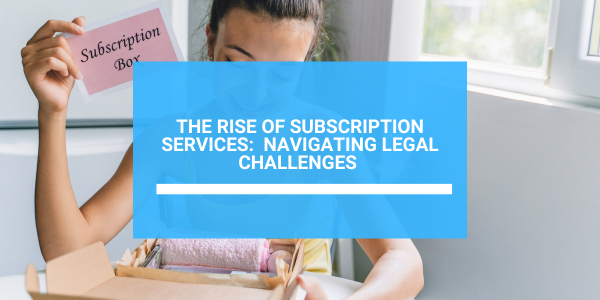The Rise of Subscription Services: Navigating Legal Challenges

Subscription services have become increasingly popular across various industries, offering convenience and, in most cases, cost savings to consumers. From streaming platforms like Netflix and Spotify to meal kits and even software-as-a-service (SaaS), subscriptions are reshaping how we access products and services. However, the surge in subscription-based models brings with it a slew of legal challenges that businesses must navigate to ensure compliance and customer satisfaction. Let’s explore these challenges, discuss consumer rights, and delve into effective contract management practices.
The Popularity of Subscription Services
Subscription services offer a unique value proposition. Instead of making a one-time purchase, consumers pay a recurring fee to access products or services. This model has gained traction for several reasons:
1. Convenience: Subscriptions eliminate the need for repeated purchases, automatically delivering products or services at regular intervals.
2. Cost-Effectiveness: They often provide cost savings by bundling products or offering lower monthly rates compared to one-time purchases.
3. Personalization: Many services tailor offerings to individual preferences, enhancing the consumer experience.
Industries from entertainment to fitness to education have adopted subscription models, recognizing their potential to create a steady revenue stream and foster customer loyalty. Additionally, subscriptions-based business models have shown to have a higher valuation when sold.
Legal Challenges in Subscription Models
While the subscription economy is booming, it also poses several legal challenges that businesses must address to avoid legal pitfalls and ensure a seamless experience for their customers.
1. Automatic Renewal Laws
One of the critical legal challenges in subscription services is compliance with automatic renewal laws. These laws are designed to protect consumers from being unwittingly locked into ongoing subscriptions. Key provisions typically include:
- Clear Disclosure: Businesses must clearly disclose the terms of the automatic renewal, including the length of the renewal period and the amount to be charged.
- Consent: Consumers must explicitly agree to the terms before being enrolled in an auto-renewing subscription.
- Cancellation: Easy cancellation mechanisms must be provided, allowing consumers to terminate their subscriptions without hassle.
Failure to comply with these laws can result in hefty fines and damage to the company’s reputation.
2. Privacy and Data Security
Subscription services often require the collection of personal information, including payment details. Ensuring the privacy and security of this data is not only a legal requirement but also critical to maintaining consumer trust. Key considerations include:
- Data Protection Regulations: Compliance with regulations such as the General Data Protection Regulation (GDPR) in the EU or the California Consumer Privacy Act (CCPA) in the US is essential.
- Secure Transactions: Implementing robust cybersecurity measures to protect consumer data from breaches is crucial.
Again, failure to comply with data privacy and security regulations can be extremely costly to a company, potentially putting them out business.
3. Consumer Rights
Subscription services must also respect consumer rights, including:
- Right to Information: Consumers have the right to be informed about the terms of their subscription, including how to cancel and what charges will apply.
- Right to Cancellation: Consumers should be able to cancel their subscription easily and without facing undue obstacles or penalties.
Ensuring Compliance and Customer Satisfaction
To successfully navigate the legal landscape of subscription services, businesses must focus on robust contract management and customer-centric practices.
1. Transparent Contracts
Transparent and straightforward contracts are key to maintaining legal compliance and fostering trust with consumers. Contracts should be written in plain English and clearly outline:
- Subscription Terms: The duration, renewal process, and costs associated with the subscription.
- Cancellation Policies: The steps consumers need to take to cancel their subscription and any applicable penalties.
2. Effective Communication
Regular and effective communication with subscribers is essential. Businesses should provide:
- Advance Notice of Renewal: Informing consumers in advance when their subscription is about to renew and any changes in terms or pricing.
- Accessible Support: Offering multiple channels for customer support, including phone, email, and chat.
3. Simplified Cancellation Processes
Making it easy for consumers to cancel their subscriptions not only ensures compliance with legal requirements but also enhances customer satisfaction. Nothing frustrates a consumer more than having to jump through hoops or navigate to 10 different web pages to find a cancellation option. Aim to simplify. Simplified processes might include:
- Online Cancellation: Providing an easy-to-navigate online platform where consumers can cancel their subscriptions.
- No-Hassle Policies: Avoiding the imposition of complex procedures or excessive penalties for cancellation.
Conclusion
Subscription services offer a compelling way for businesses to generate recurring revenue and build lasting relationships with customers. However, navigating the legal challenges associated with subscription models requires careful attention to automatic renewal laws, privacy regulations, and consumer rights. By prioritizing transparent contracts, effective communication, and simplified cancellation processes, businesses can not only ensure legal compliance but also foster customer satisfaction and loyalty. As the subscription economy continues to grow, staying informed about evolving legal requirements and best practices will be key to success. We are here to help. If you would like to set up a no-obligation consultation to discuss your subscription-based business, call our office today.




